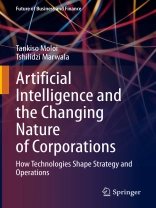This book explains how various forms of artificial intelligence, namely machine learning, natural language processing, and robotic process automation, could provide a source of competitive advantage to firms deploying them compared to those firms that would not have deployed these technologies. The advantages of machine learning, natural language processing, and robotic process automation in strategy formulation and strategy implementation are explored. The book illustrates the potential sources of advantage for the strategy formulation and strategy implementation processes, which can be derived from the deployment of each form of artificial intelligence.
表中的内容
1. Introduction to Artificial Intelligence and the Changing Nature of a Firm: Implications to Strategy and Strategy Implementation.- 2. A High-Level Overview of Artificial Intelligence: Historical Overview and Emerging Developments.- 3. A Brief Overview of the Firm’s Strategy.- 4. Strategy Implementation.- 5. Machine Learning in Strategy and Implementation.- 6. Natural Language Processing in Strategy and Implementation.- 7. Robotic Process Automation in Strategy and Strategy Implementation.- 8. Synopsis to Artificial Intelligence and the Nature of a Firm:
Implications to Strategy and Strategy Implementation.
关于作者
Tankiso Moloi is a professor of accounting at the University of Johannesburg. He has written numerous articles and book chapters in finance and accounting, including research on artificial intelligence in accounting, economics, and finance.
Tshilidzi Marwala is vice-chancellor of the University of Johannesburg. He has written numerous peer-reviewed books, book chapters, and articles in artificial intelligence, finance, and economics.












